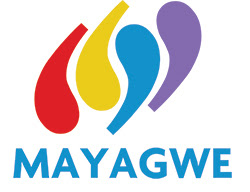This month, ATIA sat down with Mayagwe founder and director Bill Dodd to talk about how the platform is revolutionizing access to professional interpreters. With numerous ATIA members represented on the tech platform, Mayagwe represents the way of the future for clients to connect with certified interpreters and procure their services.
What is Mayagwe?
 Mayagwe is a software application that connects clients who need the assistance of language interpreters and professional language interpreters looking for job opportunities. Currently the way clients access interpreters is that they have to contact a company and submit a form. They get an invoice and have to pay a company who then has to issue payment to an interpreter. Mayagwe eliminates the middle person and clients are connected directly to interpreters who are independent contractors. It’s like the difference between taxi cab companies and Uber. The utilization of technology makes the system much faster, more efficient, and more cost effective. There is a reason “Uber” or similar apps like “Skip the Dishes” are is taking over from the traditional methods of doing business. Mayagwe is doing the same for the interpretation sector.
Mayagwe is a software application that connects clients who need the assistance of language interpreters and professional language interpreters looking for job opportunities. Currently the way clients access interpreters is that they have to contact a company and submit a form. They get an invoice and have to pay a company who then has to issue payment to an interpreter. Mayagwe eliminates the middle person and clients are connected directly to interpreters who are independent contractors. It’s like the difference between taxi cab companies and Uber. The utilization of technology makes the system much faster, more efficient, and more cost effective. There is a reason “Uber” or similar apps like “Skip the Dishes” are is taking over from the traditional methods of doing business. Mayagwe is doing the same for the interpretation sector.
What does the name mean?
Mayagwe is an Ojibway word meaning “he or she who speaks a strange language”. Mayagwe is a Canadian company and nothing could be more Canadian than honouring an Indigenous language in the name of a language company.
Where did you get the idea for starting this organization?
When I was a member of the Calgary Police Service, an incident occurred where investigators required a language interpreter ASAP. A person had been detained in relation to a bomb threat at the Calgary Provincial Court building. As a result, the court building and surrounding area had to be evacuated, displacing thousands of people and tying up multiple police resources for hours. It took over 5 hours to find an interpreter so that the situation could be resolved. This exposed the inadequacies of the current methods of finding qualified language interpreters. The Chief of Police at the time tasked me with finding a solution to this issue. As a result, I discovered that the Calgary Police Service was not unique. No other police service or other organization in the country had an effective system for accessing in-person language interpreters. As a result of funding and contributions from the Calgary Police Service, Alberta Health Services, and the Calgary Foundation, Mayagwe was born and a custom-made software application developed in Calgary was created to address this need. What use to take multiple hours (like the court house incident), or sometimes even multiple days, can now be handled in literally minutes.
Creating a system that makes using interpreters was not easy. Many problems needed to be overcome, including issues around what constituted a “professional” interpreter, favoritism, a lack of transparency, a lack of cooperation between agencies competing for government funding, siloing of resources, exploitation of new immigrants or as some immigrant service agencies like to call them “volunteers” etc. Mayagwe addresses these issues by creating a democratic and transparent system that protects the needs of clients requiring language assistance and the needs of interpreters providing that assistance. Language assistance is a professional service where people need to be treated fairly.
There was also the issue of out sourcing of interpretation services, meaning either over the phone interpretation or in-person interpretation. Because of the arduous old process of contacting many “interpreter providers” who don’t cooperate with each other and don’t share their “interpreter lists,” big clients such as Alberta Health Services began to outsource thousands and thousands of tax payer dollars to foreign companies – money and resources that could instead stay here in Alberta and support the local economy while creating good paying jobs. Everyone who uses an interpreter agrees that in-person interpretation provides better outcomes and the research also support it. The justification for over the phone is that it is more convenient and less expensive. Although there are times where over the phone may be a better option, with the Mayagwe system, we are demonstrating that using an in-person interpreter can be just as easy, and as cost effective as other options.
What’s your background?
My background is that I was born and raised in Calgary and am a unilingual English speaker so it may seem odd for me to be working in a company that is all about other languages, but I don’t think it is at all. I became a police officer because I wanted to help people and make a difference in my community and I truly admire those who can communicate in multiple languages. (they are so much smarter than me). Mayagwe is a way to continue to contribute to my community.
How did you get into this?
During my work I saw that language can be a huge barrier to providing critical services to under-served Calgarians. I met many people in our community who also wanted to help and who had the languages skills that could make a difference. One powerful example of this occurred a few years ago. The Calgary Police Service has a team who assist victims of crime called the Victims Assistance Unit or VAU. The members of this team contact Calgarians who have been the victim of a crime and offers assistance. This team does absolutely fantastic work on a daily basis and one of the people who has worked on this team is a wonderful woman named Amina. Not only is Amina a terrifically smart and empathetic person, she also has the added ability to converse in multiple languages. A few years ago a situation occurred where a woman who had recently come to Canada was the victim of a terrible crime, and the police were needed. The officers who attended to her did their best, got her to place of safety and filed a report. By chance Amina was the person from VAU who got the file and contacted this women offering assistance. During the conversation Amina recognized that she spoke the same language as the victim. Once they could fully converse it became clear that so much more had happened than the initial investigating officers had been able to determine. The victim was able to tell her whole story which was so much more complicated. As a result, more appropriate and much more serious criminal charges could be brought against the perpetrator of this crime. Amina was able to help this person navigate an unfamiliar system, help with her family situation, her immigration situation and so forth. It is a long story and brings people to tears when they hear it, but it is no exaggeration to say that Amina’s intervention and her ability to communicate fully with the victim literally saved this person’s life (the victim’s own words). Unfortunately many people still fall through the cracks and even though there are many examples like this, leadership of critical social serving agencies such as the police still do not provide their front line workers with the tools they need to provide the best service possible. We hope to help fill some of those cracks.
What are the principles and vision behind what you do?
Mayagwe is a nonprofit whose vision is to make language assistance as efficient as possible to anyone who requires it, create good paying local jobs and contribute to a better quality of life for everyone in our community.
What are the benefits for participating Interpreters?
- Provides fairness and equal access to job opportunities.
- Provides employment opportunities with maximum flexibility for participation.
- Provides business experience as independent business operators.
- Provides connection and understanding of social serving agencies, reducing any stigma which may exist about the roles of these agencies.
- Eliminates favoritism or cronyism in offering employment opportunities to a select few.
- Recognizes interpretation as a professional service.
- Quick direct payment for service.
What are the benefits for Client Agencies?
- Direct access to trained interpreters.
- Maximum flexibility in scheduling, from immediate requests to long-term scheduling.
- Ability to set criteria for interpreters unique to each organization.
- Ability to customize interpreter requests.
- Assurance of accreditation standards.
- Cost-effectiveness by only paying for services provided.
- Providing connection to people in the communities they serve.
- Reducing risk of miscommunication and improper service.
- Demonstrating commitment to inclusiveness.
What is a good story you have heard in relation to Mayagwe that you would like to share?
A good story about Mayagwe is that more and more people are recognizing the positive social impact this can have in our communities. A good example is the Canadian Western Bank who has recognized the positive social impact this will have in communities in which it operates and has provided generous financial assistance to help expand this service to Edmonton.
What is the future of Mayagwe?
The Mayagwe application is unique in Canada and plans to expand this service to social serving agencies across the country.
What’s one thing you would like interpreters to know?
If you are providing Interpretation services, you need to make certain that they are covered by professional liability insurance. If you are being contracted through a company or social serving agency to do this work, ask them to provide you the details of that insurance policy such as: the policy details, policy number, coverage amount etc. If you do not, you are potentially exposing yourself to personal risk of a lawsuit.
To join the database of interpreters on the Mayagwe system, just go to www.mayagwe.com and follow the easy steps detailed there



 Mayagwe is a software application that connects clients who need the assistance of language interpreters and professional language interpreters looking for job opportunities. Currently the way clients access interpreters is that they have to contact a company and submit a form. They get an invoice and have to pay a company who then has to issue payment to an interpreter. Mayagwe eliminates the middle person and clients are connected directly to interpreters who are independent contractors. It’s like the difference between taxi cab companies and Uber. The utilization of technology makes the system much faster, more efficient, and more cost effective. There is a reason “Uber” or similar apps like “Skip the Dishes” are is taking over from the traditional methods of doing business. Mayagwe is doing the same for the interpretation sector.
Mayagwe is a software application that connects clients who need the assistance of language interpreters and professional language interpreters looking for job opportunities. Currently the way clients access interpreters is that they have to contact a company and submit a form. They get an invoice and have to pay a company who then has to issue payment to an interpreter. Mayagwe eliminates the middle person and clients are connected directly to interpreters who are independent contractors. It’s like the difference between taxi cab companies and Uber. The utilization of technology makes the system much faster, more efficient, and more cost effective. There is a reason “Uber” or similar apps like “Skip the Dishes” are is taking over from the traditional methods of doing business. Mayagwe is doing the same for the interpretation sector.


